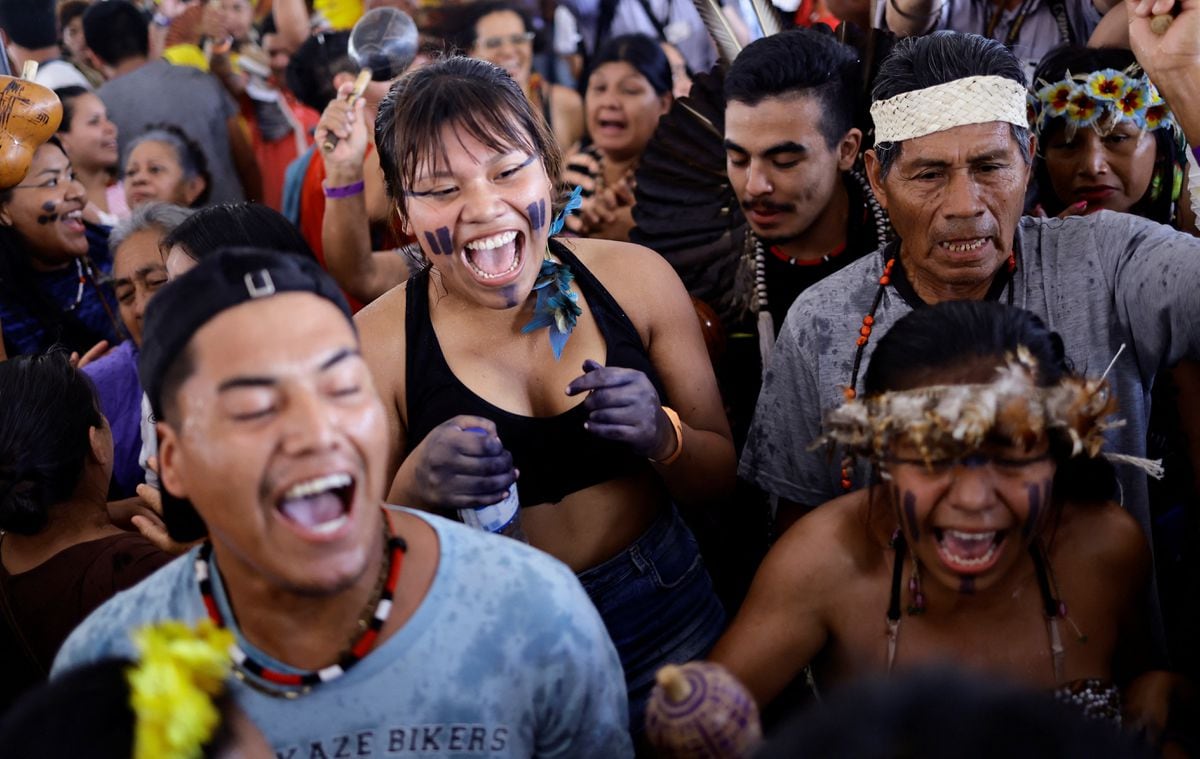Brazil’s indigenous people, descendants of those who inhabited these lands before conquest or before anyone even entertained the idea of turning them into a nation, this Thursday achieved a vital victory for their people and the environment. A majority of Supreme Court justices on Thursday rejected by nine votes to two a hypothesis championed by the agricultural sector lobby that called for setting a time limit on indigenous land claims. This judicial process, which began to be decided in the highest court in 2021, has since kept local and environmental organizations in suspension because indigenous reserves are essential to preserving the vast culture of indigenous people, but also to protect nature and biodiversity in both countries. The Amazon and the states where crops and livestock are advanced.
Indigenous representatives followed this trial, which they consider historic, from the same Supreme Court hall in Brasilia. For two years, each of the long and medium-length hearings aroused enormous expectations as this case established the jurisprudence. The outcome therefore has huge implications for indigenous people, of course, but also for the agricultural sector, which is the most dynamic sector of the economy, the one that achieves the most growth and generates the most jobs.
Once again, in this polarized Brazil, the Supreme Court is divided into ideological camps. The two judges who voted in favor of the agribusiness thesis were those appointed by the far-right former president, Jair Bolsonaro, who refused to demarcate even a centimeter of new indigenous land or biodiversity.
he lobby The agribusiness was intended so that indigenous people would not be able to claim lands that were not settled on the day of the Constitution’s publication, i.e. 5 October 1988. Their argument was that with this time limit the myriad of land and territorial disputes could be resolved. Providing legal security for agricultural producers. For indigenous people, imposing this restriction meant legitimizing the multiple expulsions that had occurred before that date, especially during the dictatorship that ended in 1985.
Indigenous people are a very small minority of Brazilians (1.7 million among those who live in villages and cities) and their lands make up more than 13% of the territory. They perform a vital function for the planet because they are always the areas where nature is best preserved. In satellite images of the Amazon or other ecosystems, indigenous lands and nature reserves are easily recognizable because they are usually green islands.
“Win!” “We have defeated the legal and political thesis of the time frame,” declared in a memorandum APIB, the organization that brings together indigenous peoples in Brazil and which until a few months ago was run by Sonia Guajajara, Brazil’s current minister of indigenous peoples. Government of Luis Inácio Lula da Silva. However, the APIB warns that during the judicial process some risks have emerged, such as the possibility of compensation for agricultural producers.
Information is the first tool to combat climate change. Subscribe to it.
Participate
“Our indigenous right is guaranteed, but there are issues in the Supreme Court debate that threaten us,” the APIB memo said, adding that “the proposal to compensate for barren lands may make the demarcation and exclusive usufruct of indigenous lands infeasible,” which is also a right. It cannot be touched.”
The process of demarcating indigenous lands was very intense in the first years after Brazil restored democracy in 1985. But it stopped a decade ago due to the political, social and economic crisis the country was going through, and in the last four years it has been completely paralyzed. Retired military man Jair Bolsonaro promised in his first presidential campaign not to legalize “one centimeter of indigenous land” and he kept his promise. Lula has resumed the process, but at a more timid pace than indigenous people and conservationists would have liked. He resumed the creation of indigenous lands in eight areas carefully selected from a long list of requests because he avoided those that would be the most politically and legally conflicting.
The case in which the Supreme Court has now ruled concerns specific land in the state of Santa Catarina, in the south of the country. In 2009, a lower judge stripped the Ibirama-Laklano area of its status as an indigenous reserve, arguing that indigenous people were not there on the day the Constitution, which recognizes indigenous rights to their lands, including their own, came into force. Exclusive exploitation. Bolsonaro has failed in his attempt to allow outsiders to exploit those riches as well.
President Lula and his government were waiting for what the Supreme Court would decide in this case. But the Supreme Court’s decision does not constitute an end to this issue. Because the agricultural lobby is looking for an alternative means to achieve its goal, which is the Senate, which is discussing a draft law in this regard. Your honorable members are scheduled to vote on it next week.
You can follow the climate and environment at Facebook And sor sign up here to receive Our weekly newsletter

“Music buff. Social media lover. Web specialist. Analyst. Organizer. Travel trailblazer.”


:quality(85)/cloudfront-us-east-1.images.arcpublishing.com/infobae/GLHO2KZ3BBGWHGT72ZRTHEAHQ4.jpg)
:quality(85)/cloudfront-us-east-1.images.arcpublishing.com/infobae/PNZQUCTDTBESBMD2HBP2GE54FY.jpg)
:quality(75)/cloudfront-us-east-1.images.arcpublishing.com/elcomercio/S2ZDTT636ZG3RG6DCMVUIMZPXY.jpg)
:format(jpeg):focal(2695x2605:2705x2595)/cloudfront-us-east-1.images.arcpublishing.com/gfrmedia/ORZECSZYGNCNFE42WJMQSGDKV4.jpg)

More Stories
Another trap of the Chavista dictatorship: out of nearly 8 million Venezuelan immigrants, only 6,528 were able to register to vote
Bukele has consolidated his absolute power in El Salvador with a Congress tailored to his needs, allowing him to approve reforms without opposition.
Petro announces that Colombia will sever diplomatic relations with Israel